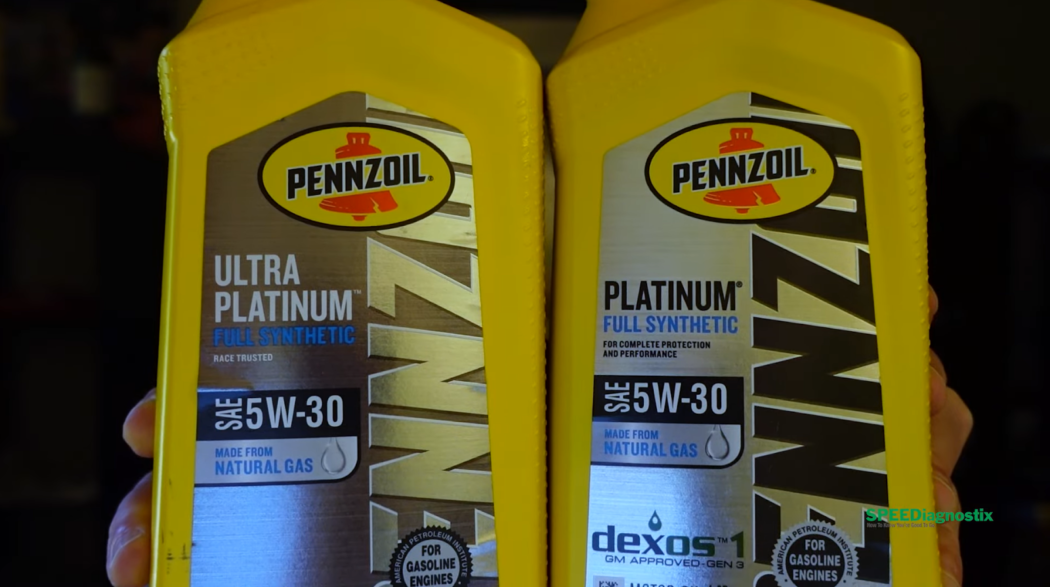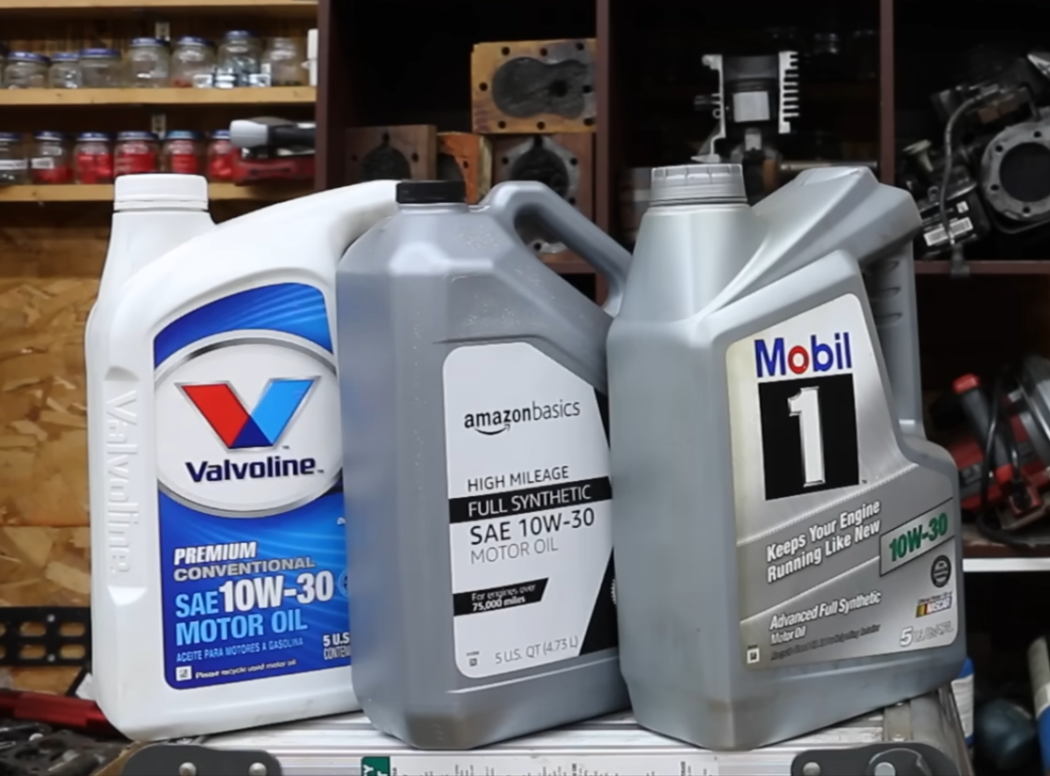Engine oil is an indispensable component for your vehicle’s operation, playing a vital role within the engine. Typically, it’s recommended to replace it every 8,000 miles (12,874 km).
Among the various oil options available for your vehicle, two standout choices are Pennzoil Platinum and Mobil 1. Both of these options offer exceptional protection and performance, making the decision between them quite a dilemma. Nevertheless, Mobil 1 tends to shine particularly in race cars, whereas Pennzoil Platinum gains a slight advantage due to its broader compatibility across various engine types.
The aim of this article is to simplify your selection process between Pennzoil Platinum and Mobil 1. But before delving into that, let’s explore the shared features that these two products offer.
Common Traits Between Pennzoil Platinum and Mobil 1
Pennzoil Platinum and Mobil 1, two prominent names in the realm of synthetic motor oils, share a foundation composed of a class of compounds known as esters. These compounds contribute significantly to the oils’ exceptional qualities, aiding in their ability to effectively cling to the engine’s surfaces. By doing so, they play a pivotal role in preventing the accumulation of sludge and the gradual wear and tear that can develop over time.
In addition to their ester-based composition, both Pennzoil Platinum and Mobil 1 are enriched with carefully formulated additives. These additives serve a dual purpose: enhancing the oils’ durability and acting as a safeguard against corrosion that may otherwise affect the vital components within your vehicle’s engine.
Remarkably, the origins of both products trace back to the United States. Pennzoil Platinum is meticulously crafted in Pennsylvania, while Mobil 1 takes shape in the heart of Texas. This distinctly American production adds to the pride associated with these oils, which have garnered widespread recognition for their remarkable ability to offer robust protection for high-performance engines.
However, even as these oils share these fundamental characteristics, the divergences between them are equally noteworthy. To better understand these distinctions, let’s embark on an in-depth examination, commencing with a closer look at Pennzoil Platinum.
About Pennzoil Platinum
Pennzoil Platinum stands as a premium synthetic blend motor oil that combines Group III and Group IV esters in its formulation.
This advanced motor oil is enriched with detergent and dispersant additives, meticulously crafted to facilitate engine cleansing and avert the accumulation of sludge over the course of its use. Engineered to cater to a wide spectrum of gasoline engines, including those equipped with or without turbocharged direct injection technology (TDI), Pennzoil Platinum emerges as a versatile solution.
Its versatility extends across gasoline, hybrid, and Diesel engines, embracing a comprehensive array of engine types. Notably, an iteration known as the Euro variant aligns itself with the emission standards mandated by the European Union.
A distinguishing factor of Pennzoil Platinum lies in its foundational components sourced from natural gas. Leveraging the fact that methane constitutes 80% of natural gas, this elemental base allows for easier purification compared to products originating from crude oil.
Within the Pennzoil Platinum family, one encounters the “Ultra Platinum” and “Platinum High Mileage” alternatives. The former stands designed to provide safeguarding for high-performance engines, even in extreme conditions. Conversely, the latter variation takes on the role of shielding engines that have surpassed the 75,000-mile (120,701 km) mark, offering tailored protection for these well-traveled powerhouses.
Pennzoil Platinum: Advantages and Drawbacks

Wondering if Pennzoil Platinum deserves your engine’s trust? The succinct response is affirmative, but a deeper dive is in order. Let’s closely examine its benefits and limitations.
Advantages:
- Natural Gas Composition: Derived from natural gas, it boasts a lack of contaminants that could obstruct your engine’s performance. Moreover, its enhanced capability to handle extreme temperatures surpasses that of conventional motor oil;
- Sealing Capability: Particularly, the Platinum High Mileage variant exhibits the unique ability to seal leaks in older engines, contributing to their maintenance and longevity;
- High-Performance Compatibility: Demonstrating prowess in high-performance engines, Pennzoil Platinum excels even under demanding conditions;
- Versatile Engine Suitability: Its adaptability extends to both Diesel and gasoline engines, catering to a diverse range of vehicles;
- Extended Oil Change Intervals: With the capacity for a 15,000-mile (24,140.16 km) usage span before changing, it offers convenience and longevity.
Drawbacks:
- Higher Price Tag: Comparatively, the cost of a 5-quart (4.73-liter) container edges higher than more commonplace brands, impacting affordability;
- Limited Racing Applicability: Notably, it isn’t the recommended choice for racing endeavors unless paired with Ultra Platinum.
This encapsulates the essential insights regarding Pennzoil Platinum. Overall, it stands as an excellent choice for your automobile — though, as we’ll soon see, the upcoming product also vies for consideration.
Mobil 1 Engine Oil
Mobil 1, a renowned synthetic engine oil brand, has maintained a prominent presence in the market for over four decades. Esteemed for its exceptional quality and impressive performance, it has garnered favor among seasoned mechanics.
Elevated as a premier choice, Mobil 1 holds a reputation for safeguarding racing car engines with utmost efficacy. Notably, Mobil 1 15W-50 finds application in turbocharged and supercharged engines across the globe. It has gained the trust of Formula 1 (F1) teams for providing superior protection to their race cars.
Similar to Pennzoil Platinum, Mobil 1 falls within the category of synthetic oils. This classification endows it with the capability to retain its performance even under extreme temperature conditions, enabling extended usage of over 10,000 miles (16,093.4 km) before necessitating an oil change.
Mobil 1’s base oil derives from crude sources, implying that it contains varying hydrocarbon levels across deposits. While the refinement process for these hydrocarbons might be more time-intensive compared to Pennzoil’s Platinum series, they culminate in the creation of an efficient motor oil product.
However, my intention isn’t to advocate for any specific oil brand. Rather, the objective is to present a comparative analysis of two prominent brands that engender trust among high-performance engine owners, who occasionally grapple with the decision of which brand to opt for.
With this context in mind, let’s delve into the advantages and drawbacks of Mobil 1.
Mobil 1: Advantages and Drawbacks
In the spirit of comprehensive evaluation, let’s explore the aspects that make Mobil 1 a noteworthy choice, alongside some considerations that warrant attention. Emphasizing the affirmative aspects is a prudent approach, offering a healthier perspective.
Advantages:
- Cold-Weather Resilience: Mobil 1’s standout feature is its ability to retain performance even in freezing temperatures, ensuring reliable lubrication regardless of the climate;
- Simultaneous Cleaning and Lubrication: Beyond lubrication, this oil effectively cleans engine components, contributing to the overall health of the engine;
- Temperature Management: Mobil 1 contributes to maintaining cooler and quieter engine operations, promoting smoother functioning;
- Compatibility with Older Vehicles: It accommodates older car models, providing optimized performance for engines that have seen years of use;
- Enhanced Fuel Efficiency: Mobil 1’s impact extends to improved fuel economy, aligning with eco-conscious driving practices;
- Cost Efficiency: Comparatively, Mobil 1 carries a slightly more economical price point than Pennzoil Platinum.
Drawbacks:
- Diesel Engine Suitability: Notably, unless specified on the label, Mobil 1 is not recommended for Diesel engines, limiting its scope of application;
- Darker Appearance: Due to its crude oil base, Mobil 1 may appear darker than Pennzoil Platinum. However, it’s important to note that the color does not necessarily reflect effectiveness. The age-old wisdom holds true: Looks can be deceiving, a principle well-recognized by NASCAR pit crews.

This comprehensive analysis serves to illuminate both the strengths and considerations related to Mobil 1, aiding in informed decision-making for those seeking optimal engine performance.
Oil Grades
If you’ve engaged in contemplation over these two offerings during your store visit, you likely observed their availability in diverse grades, ranging from 5W-30 to 15W-40.
But what significance lies behind these grades?
The letter “W” within the grade signifies “weight,” and these grades serve as descriptors of an oil’s viscosity — its thickness. The grade choice is intrinsically linked to the oil’s consistency and quality. A thicker oil equates to heightened engine protection.
You might be inclined to assume that opting for a high-grade iteration of either Pennzoil or Mobil 1 will guarantee success. However, caution is advised. While high-grade oils indeed perform admirably in hot weather conditions, they can potentially impede your engine’s functioning when confronted with colder temperatures, particularly during winter. The wisest course of action lies in adhering to the oil grade prescribed by your vehicle’s manufacturer.
It’s noteworthy that both Pennzoil Platinum and Mobil 1 offer an array of grades. Therefore, a prudent approach involves meticulous consideration during your shopping expedition, refraining from casual decisions regarding the fluid that fuels your engine. Adhering to the recommended oil grade ensures not only enhanced protection but also heightened fuel efficiency and reduced emissions.
Pennzoil Platinum vs. Mobil 1: A Comprehensive Comparison
After delving into intricate specifics concerning both these offerings, the subsequent table aims to distill their attributes into a more accessible format for your convenience.
| Aspect | Pennzoil Platinum | Mobil 1 |
|---|---|---|
| Synthetic/Conventional | Synthetic | Synthetic |
| Viscosity | Multiple Grades | Multiple Grades |
| Mileage Between Changes | 15,000 miles (24,140.2 km) | 10,000 to 15,000 Miles (16,094.44-24,140.2 km) |
| Base | Natural Gas | Crude Oil |
| Noack Volatility | 11% | 9.17% |
The two oils are closely matched in most aspects, with one exception: the Noack Volatility Test. Mobil 1 earns a lower score in this category, which might lead you to think that Pennzoil Platinum emerges as the superior choice.
However, this assumption is not accurate. The Noack Volatility Test operates akin to golf: a lower percentage signifies higher quality.
Understanding the Noack Volatility Test
Diving into the intricacies of motor oil evaluation, we encounter the Noack Volatility Test, pioneered by Kurt Noack during the 1930s (not to be confused with the musician). This test serves the purpose of gauging the degree of evaporation that a motor oil undergoes at a temperature of 150 degrees Celsius (302 degrees Fahrenheit). The percentage highlighted in the preceding table signifies the weight-based proportion of oil that evaporates during this process.
Within the realms of industry norms, the Noack Volatility Test tends to hover between the range of 13% and 15%. Remarkably, both Pennzoil Platinum and Mobil 1 excel within these parameters, reflecting their performance.
However, when this test serves as the sole criterion for assessment, Mobil 1 gains an edge. Its tendency for lower evaporation, especially under conditions of high engine revolutions, translates into enhanced engine protection. This outcome underscores the pivotal role of the Noack Volatility Test in offering insights into motor oil performance under demanding circumstances.
Optimal Oil Selection: Pennzoil Platinum or Mobil 1?
Determining the most fitting motor oil for your vehicle involves a consideration of your specific driving circumstances. While you might not be maneuvering an ultra-high-performance racing car around town, both Pennzoil Platinum and Mobil 1 offer secure choices for your everyday automotive needs.
Pennzoil’s Platinum line encompasses three distinct variations: Platinum, Platinum Euro, and Ultra Platinum. Each variant is crafted as a synthetic oil, with a shared focus on safeguarding turbocharged engines. The Euro version takes center stage in meeting emission standards set within the European continent. In contrast, Pennzoil Platinum proves to be a consistently wise option for a wide range of vehicles. The Ultra Platinum iteration caters to racing vehicles or individuals who relish maintaining their vehicle’s tachometer close to the red zone, indicative of high-performance driving.
Mobil 1 follows suit with its range of versions tailored to diverse requirements. These encompass a Diesel formulation, a high mileage blend, a European car-specific formula, and more. An essential guideline here is to scrutinize the label and ensure alignment with the specifications of your vehicle. By effectively matching the oil variant to your driving context, you facilitate optimal engine performance and longevity.
Conclusion
When it comes to these two motor oils, there’s truly no incorrect decision. Each is meticulously engineered to provide robust protection to high-performance engines, ensuring a minimum of 10,000 miles (16,094.44 km) of reliable operation.
In essence, Mobil 1 claims a slight edge for application in race cars, while Pennzoil Platinum shines in its versatility, capable of safeguarding an array of engine types (gas, Diesel, hybrid) through a single formulation.
Ultimately, you’re making a solid choice with either option. Here’s to enjoyable and smooth drives ahead.











